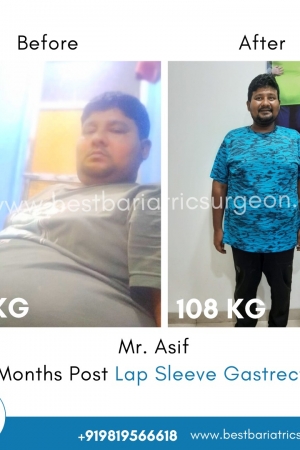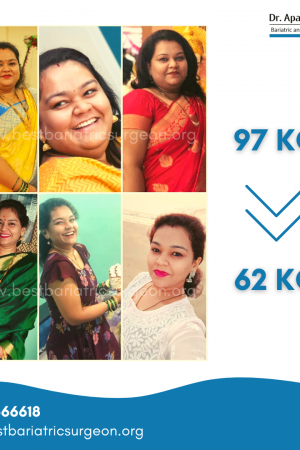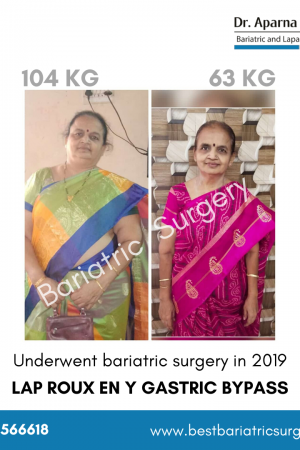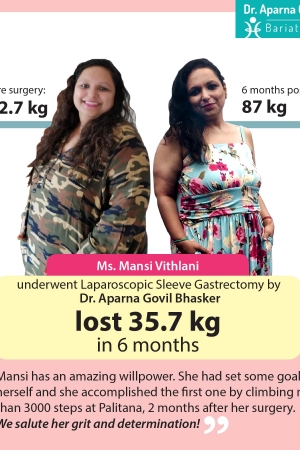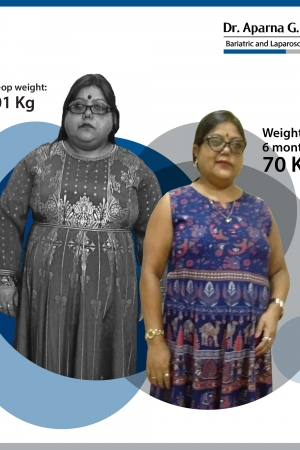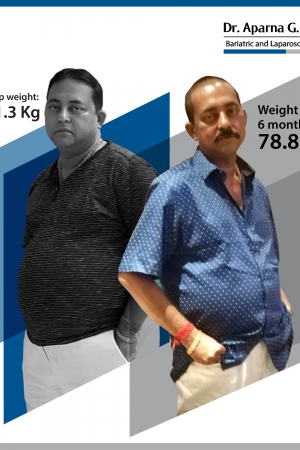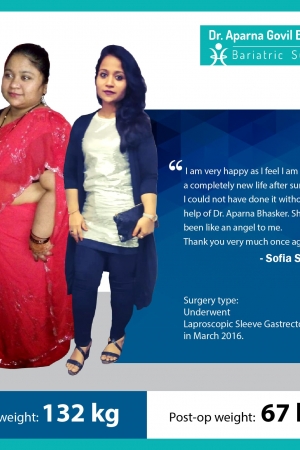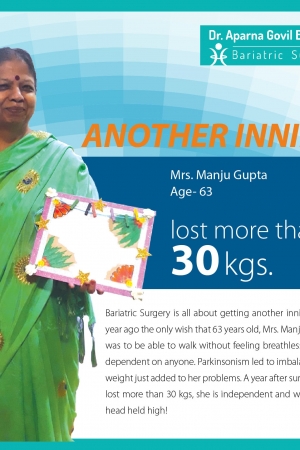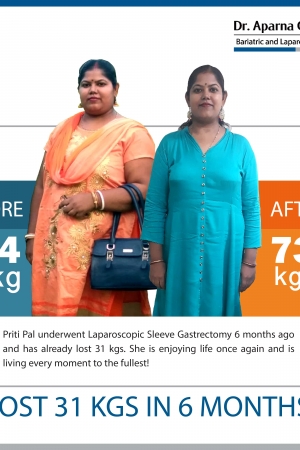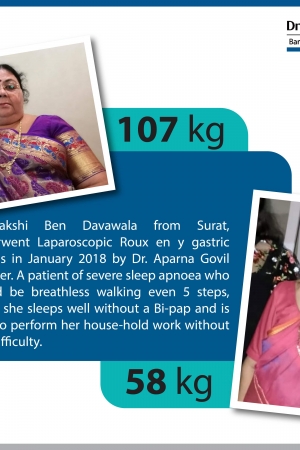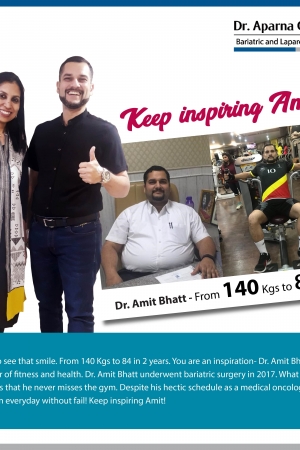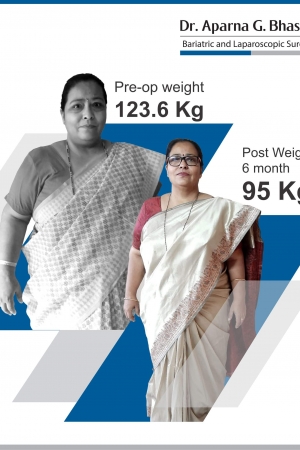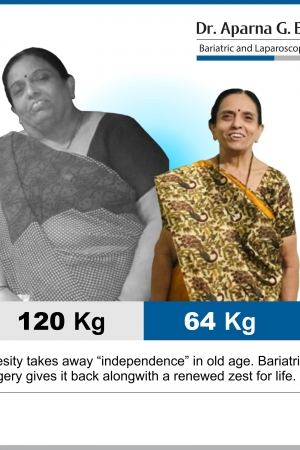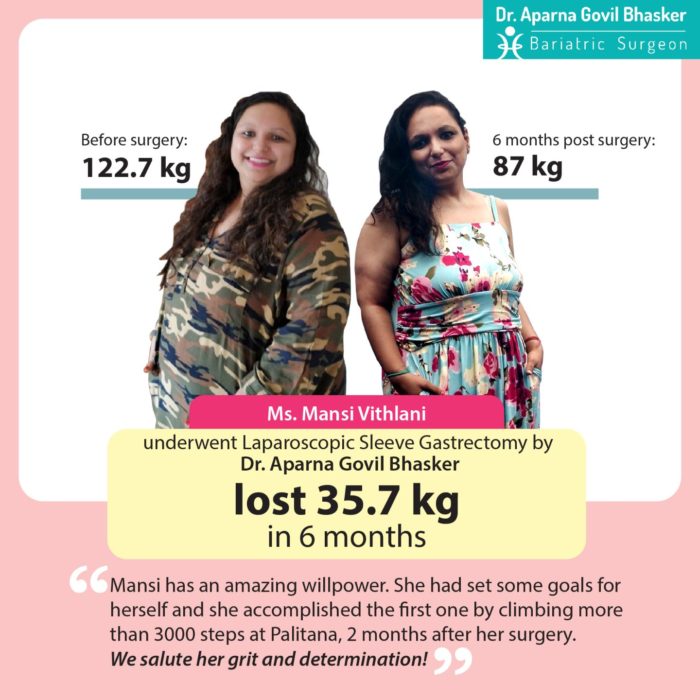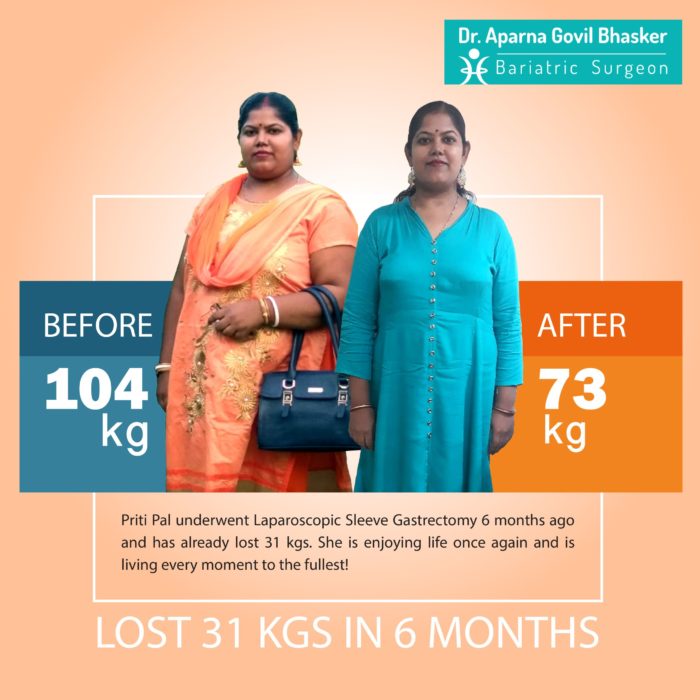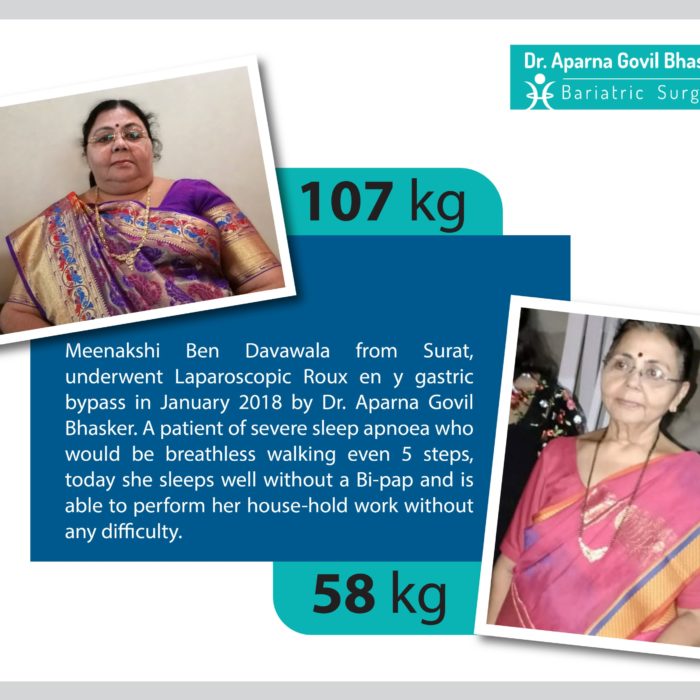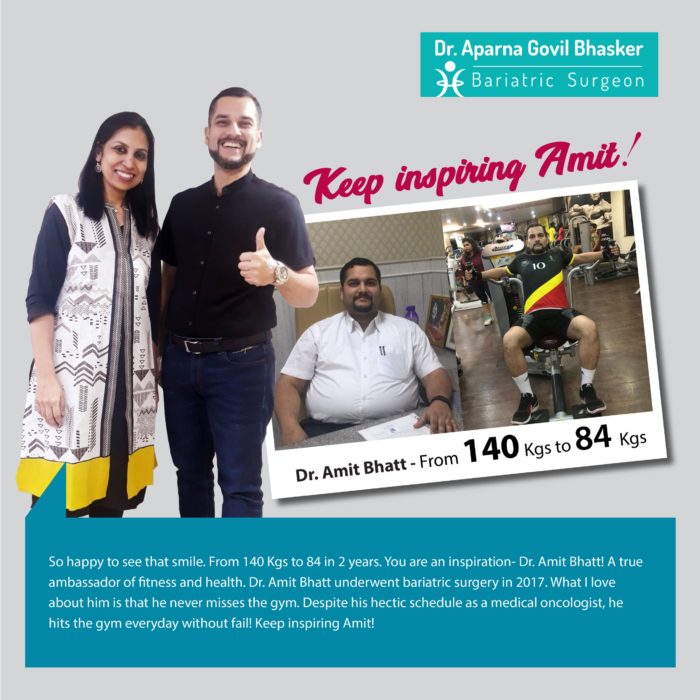
Roux-EN Y Gastric Bypass Surgery in Thane
- Home
- Roux-EN Y Gastric Bypass Surgery in Thane
Roux-EN Y Gastric Bypass Surgery in Thane
“Fitness is not about being better than someone else, it is about being better than what you used to be”
Obesity has emerged as one of the most dreaded diseases of this century. Obesity has poor effects on almost every organ in the body. Unfortunately, there is no magic pill yet, that can help people to lose weight. People who have attempted to lose weight, know how difficult it is to not only lose weight but also to maintain the weight loss. Unfortunately, more often than not, they meet with disappointment and once the weight loss program is stopped, they tend to gain more weight than what they had lost. This entire process can be extremely disheartening and disappointing for the patients.
If you have tried hard to lose weight without success and the weight is now bearing you down, you have chosen the right option because bariatric surgery is the only way at the moment that can lead to sustained weight loss in morbidly obese patients. Bariatric surgery, not only helps to lose massive amount of weight, but it also makes it easier to maintain the weight loss.
Laparoscopic Roux-en y gastric bypass surgery in Thane
Laparoscopic Roux-en y gastric bypass is one of the oldest type of bariatric surgery. In the 1970s, surgeons in USA observed that some patients were losing weight after certain kinds of gastro-intestinal surgeries. This led to the birth of bariatric surgery which proved to be one of the most effective treatment options for morbid obesity. Out of all bariatric procedures, a laparoscopic Roux-en y gastric bypass is considered as one of the best and the “gold-standard” procedure.
Who can undergo a laparoscopic Roux-en y gastric bypass in Thane
The IFSO- APC (International Federation for Surgery for Obesity and Metabolic Disorders – Asia Pacific Chapter) guidelines for weight loss surgery are as mentioned below:
- Bariatric surgery/obesity surgery/weight loss surgery must be considered for the treatment of obesity for acceptable Asian candidates with BMI ≥ 35 Kg/m2 with or without any associated diseases.
- Bariatric surgery/metabolic surgery must be considered for the treatment of type 2 diabetes or metabolic syndrome for patients who are inadequately controlled by lifestyle alterations and medical treatment for acceptable Asian candidates with BMI ≥ 30 Kg/m2.
- Bariatric surgery/metabolic surgery may also be considered as a non-primary alternative to treat inadequately controlled type 2 diabetes or metabolic syndrome for suitable Asian candidates with BMI ≥ 27.5 Kg/m2.
Laparoscopic Roux-en y gastric bypass is the treatment of choice for obese patients suffering from type 2 diabetes, high cholesterol, hiatus hernia and GERD.
How Roux-en y gastric bypass surgery in Thane performed?
This surgery is performed by laparoscopic or key-hole technique. In this technique, 4 to 5 tiny 0.5 to 1 cm cuts are made on the abdomen and the entire surgery is performed using a camera and laparoscopic instruments. This is minimally invasive and there is no big cut like the surgeries performed earlier. All the stitches are absorbable and no stitches are to be removed later. Advantages of laparoscopic surgery are- less pain, faster recovery and earlier return to work. Most patients are discharged from the hospital 36 to 48 hours after their operation depending on their clinical status.
- During the surgery, a longitudinal 30 – 50 cc pouch of the stomach is created using surgical staplers. A 50 to 100 cm long part of the small intestine called the jejunum is re-routed and attached to this pouch using staplers. Later, a jejuno-jejunostomy is performed. In this surgery, most of the stomach, first part of the intestine called duodenum and 50 to 100 cm of the second part of small intestine called the jejunum is bypassed.
- A silicon band may sometimes be placed on the stomach pouch. This prevents the pouch of the stomach from enlarging in the long term. This helps in long term weight maintenance and prevents weight regain to some extent. This procedure is called as the Banded Roux en y gastric bypass.
Bariatric Surgery FAQ (Frequently asked questions)?
Bariatric Surgery/Obesity Surgery/ Weight Loss Surgery in india Patients Before After Photos
How does weight-loss happen
Following mechanisms lead to weight loss after laparoscopic Roux-en y gastric bypass.
- Small stomach pouch restricts the quantity of food intake. This leads to caloric restriction which is the highest in the initial months after surgery.
- Hunger sensation goes down and patients are comfortable even after eating very less quantity of food.
- The re-routing of intestines leads to mal-absorption. This means that some of the calories consumed by the patient, will not be absorbed by the body.
- After this surgery, there is an early release and activation of intestinal hormones. This helps in weight loss as well as improvement of co-morbidities especially as type 2 diabetes etc.
- There are many other mechanisms and yet unidentified role of bile acids and gut flora that may help in weight loss and improvement of co-morbidities after this surgery.
Results after laparoscopic Roux-en y gastric bypass in Thane
- Patients may lose up to 65 to 75% of their excess weight over a period of 12 to 18 months after this surgery. This can become better if the patient modifies his/her lifestyle and follows a strict diet and exercise program as guided by the team. Best results are seen in patients who are motivated to follow a healthy lifestyle.
- This surgery also leads to a significant improvement in associated diseases such as type 2 diabetes, high blood pressure, high cholesterol, heart disease, risk of venous thrombo-embolism, gout, acid reflux, fatty liver, PCOD, infertility, joint pains, obstructive sleep apnoea and so on.
Bariatric Surgery/Obesity Surgery/ Weight Loss Surgery in india Patients Before After Photos
Long term weight loss goals
- Bariatric surgery must not be seen as a short cut to weight loss. The patient and the doctor must work as a team to achieve best results in the long term. It is extremely important to be diligent with your follow-up to get best results after surgery.
- Long term weight loss goals can be achieved with help of a team that consists of a doctor, an endocrinologist, a nutritionist and a psychologist. This support team of experts will keep you motivated, provide advice and help you to work through weight-loss barriers.
- Attending support group meetings is very important for long term success after bariatric surgery.
Who is not eligible for laparoscopic Roux en y gastric bypass
Apart from the routine contra-indications for any surgery, laparoscopic Roux en y gastric bypass must not be performed in the following
- Pregnant women
- Patients with severe psychiatric disorders who do not have family support
- Smokers
- Patients with inability to take nutritional supplements
- Patients who are medically unfit for surgery and anesthesia
Bariatric Surgery FAQ (Frequently asked questions)?
Complications after laparoscopic Roux en y gastric bypass
- Laparoscopic Roux-en y gastric bypass surgery is as safe as other surgeries like a knee replacement or a gall bladder surgery. Overall complication rate after bariatric surgery is approximately 1%. Infact, the complication rate is much lower than cancer surgery or surgery for esophagus, valve replacement etc.
- It is important to follow the protocols set by the team and to take nutritional supplements as advised. Failure to take nutritional supplements may result into nutritional deficiencies in future.
- Smokers must strictly stop smoking. Smoking can lead to marginal ulcers and other complications that can be life-threatening.
- The pros and cons will be explained in detail to you during your consultation.
Dr. Aparna Govil Bhasker has one of the highest experiences in performing banded as well as non-banded Roux-en y gastric bypass surgery in the country. The biggest plus of coming to us for your surgery is our personalized care. Every patient is equally important for us and we assure you that your smallest queries will be addressed at the earliest.
It is also extremely important for the patient to be mentally prepared and be positive before undergoing a surgery. A positive attitude goes a long way in getting good results after surgery. We request you to be positive and have faith. We wish you all the best for your journey of weight loss. Cheers! to being a different you.
Last but not the least- “There is no shortcut. It takes time to create a better and stronger version of yourself.”
Patient Stories
- Mansi considered bariatric/ weight loss surgery as she was suffering from grade III obesity with a Body Mass Index (BMI) of 47.5 Kg/m2. At 121.7 Kg she was not able to exercise much due to severe knee pain. She would feel breathless on exertion. Her sonography revealed grade II fatty liver. She underwent a Laparoscopic Sleeve Gastrectomy on 14th of November 2018. She knew that bariatric surgery was not a shortcut to weight loss, and worked very hard on changing her lifestyle post surgery. She exercises for 2-3 hours daily and follows a great diet regime. She has an amazing will power as she was able to accomplish her goal of climbing more than 3000 steps at Palitana just after 2 months post surgery. She lost 35.7 Kg in 6 months, we salute her grit and determination!
- Priti was 104 kg and suffered from high cholesterol, knee & back pain. She also had grade II fatty liver. She underwent a Bariatric/weight loss surgery in the form of Laparoscopic Sleeve Gastrectomy on 22nd of December 2018. In the last 7 months her weight has come down to 73 Kgs. Her cholesterol levels and knee pain are under control and fatty liver has resolved. She is extremely happy with the way she looks & feels now and loves getting all the "likes" and admiration on her pictures posted on social media. Her weight loss journey will continue and she will lose more weight in the coming months.
- When she came to us, she was suffering from diabetes mellitus, high blood pressure, severe sleep apnoea and gout. She had already undergone a total knee replacement and was advised to use Bi-pap on a regular basis. Losing weight had become crucial and critical. She underwent a Bariatric/Weight loss surgery in the form of Laparoscopic Roux En Y Gastric Bypass on 24th of January 2018 and lost 47 kgs in 1 Year. Her present weight is 60 Kg, she is off Bi-pap machine, diabetes free and came down to 2 medicines from 4 for control of high blood pressure. She feels much more independent, is able to do all her household chores and religiously goes for a brisk walk daily for an hour. She is the lifeline of her family and loves her new self.
- Dr. Bhatt is a practising medical oncologist in Pune. He struggled with obesity for many years. At 140 kgs, he decided to undergo a Laparoscopic Banded Roux en Y Gastric Bypass in Feb 2017. He has lost 55 kgs. Dr. Bhatt has adopted diet and lifestyle modification as a way of life and is seen in the gym every evening despite his busy schedule. He has become a fitness role model for everyone around him and that includes his patients. One of the most inspiring journeys.
Best Bariatric and Laparoscopic Surgeon Dr. Aparna Govil Bhasker
Currae Specialty Hospital
Ground floor, Highstreet cum Highland Corporate Centre, near Big Bazaar, Kapurbawdi, Junction, Thane, Maharashtra 400607
Mobile: +919819566618
Email: draparnagovil@gmail.com , info@bestbariatricsurgeon.org
Website: www.bestbariatricsurgeon.org www.aparnagovilbhasker.com
Social Media:
Facebook- https://www.facebook.com/draparnagovilbhasker/
Linked in- https://www.linkedin.com/in/dr-aparna-govil-bhasker-82836b34/
Twitter- https://twitter.com/aparnabhasker
Instagram- https://www.instagram.com/draparnagovilbhasker/?hl=en
You tube- https://www.youtube.com/user/aparnagovil/videos?view_as=subscriber
About Dr. Aparna Govil Bhasker
Dr. Aparna Govil Bhasker is an accomplished Bariatric Surgeon and Laparoscopic GI Surgeon. Extremely passionate about her field of specialization. She completed her MBBS and MS in General Surgery in 2006, from Mahatma Gandhi Institute of Medical Sciences (MGIMS), Sewagram. Set up in 1967 by none other than the first health minister of India, Ms. Sushila Nayar, MGIMS is deeply rooted in Gandhian ethics. Read more


Surgeon in India


Bariatric Surgery: Pros and Cons
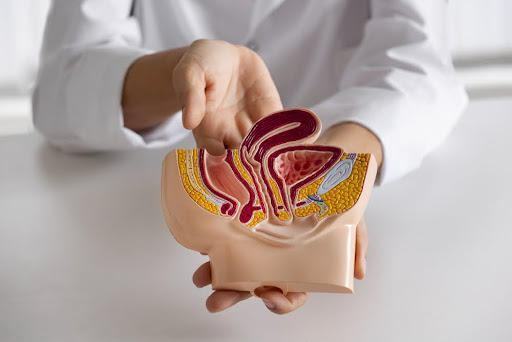
Types of Hernias and Their Treatment Options Explained
- Intra-Gastric Balloon Insertion Surgery
- Laparoscopic Adjustable Gastric Banding Surgery
- Gastric Sleeve Surgery / Laparoscopic Sleeve Gastrectomy
- Single Incision Sleeve Gastrectomy Surgery
- Laparoscopic Roux-en Y Gastric Bypass Surgery
- Laparoscopic Banded Roux-en Y Gastric Bypass Surgery
- Laparoscopic Mini Gastric Bypass Surgery /Omega Loop Bypass
- Laparoscopic Sleeve Gastrectomy with Duodeno-Jejunostomy Surgery
- Laparoscopic Duodenal Switch Surgery
- Laparoscopic Sleeve Gastrectomy with Duodenal Ileostomy (SADI) Surgery
- Laparoscopic Revisional/Redo Bariatric Surgery
- Metabolic Surgery for Diabetes
- Terms & Conditions
- Privacy Policy
- Sitemap
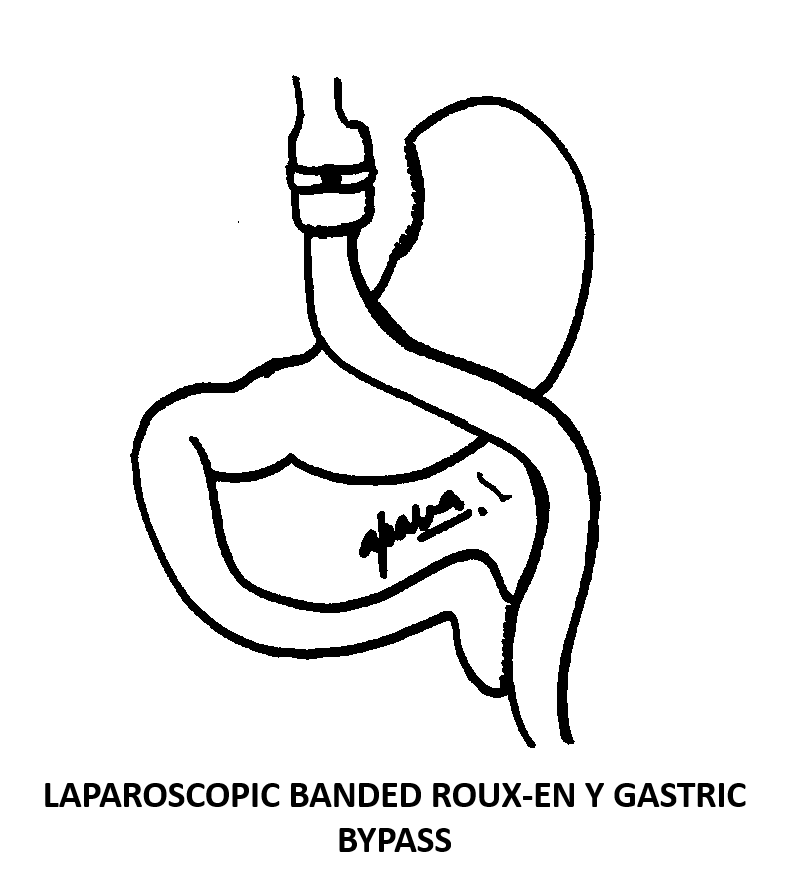 This surgery is performed by laparoscopic or key-hole technique. In this technique, 4 to 5 tiny 0.5 to 1 cm cuts are made on the abdomen and the entire surgery is performed using a camera and laparoscopic instruments. This is minimally invasive and there is no big cut like the surgeries performed earlier. All the stitches are absorbable and no stitches are to be removed later. Advantages of laparoscopic surgery are- less pain, faster recovery and earlier return to work. Most patients are discharged from the hospital 36 to 48 hours after their operation depending on their clinical status.
This surgery is performed by laparoscopic or key-hole technique. In this technique, 4 to 5 tiny 0.5 to 1 cm cuts are made on the abdomen and the entire surgery is performed using a camera and laparoscopic instruments. This is minimally invasive and there is no big cut like the surgeries performed earlier. All the stitches are absorbable and no stitches are to be removed later. Advantages of laparoscopic surgery are- less pain, faster recovery and earlier return to work. Most patients are discharged from the hospital 36 to 48 hours after their operation depending on their clinical status.
